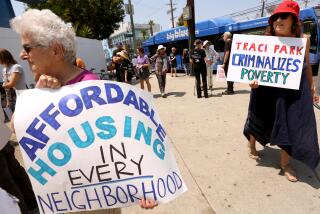Feeling Superior Is No Solution
- Share via
At a recent dinner event, I was seated next to a candidate for Congress. Inevitably, our conversation drifted to our urban crisis and issues related to youth involved in gangs and the sale of drugs. He finally asked me pleadingly, “Well, don’t these people know the difference between right and wrong?” How I longed, I told him, to live in a world as simple as that.
I felt much the same when President Clinton signed his “one strike and you’re out” order for those who live in public housing and have been caught selling drugs or engaged in violence. Now, conceivably, whole families can become homeless for the fault of one of their members. Can we not do better than this? Couldn’t we do more than question the ability of poor people to find their moral way, and evicting them once we think that they can’t?
I work in Eastside Los Angeles’ Pico-Aliso housing projects, the largest west of the Mississippi. The truth about this place is that simply living here is difficult. Life is hard and the obstacles are many. Single mothers valiantly struggle to pay the rent and feed their kids. Economic chaos is part of the air we breathe here and it typically results in emotional chaos. The young in our projects have come to discover, more and more, that they have been left behind. Not surprisingly, they plan their funerals, not their futures. Two young men died at their own hands in one recent week.
To underscore the degree of difficulty there is in living in these projects is not to excuse bad behavior. And yet, any good analysis of our urban ills that will lead us to effective solutions must begin in this place. Simply put, it is more difficult for parents to raise their kids here. It is increasingly harder in the projects for young people to navigate the perilous waters of adolescence and reach tentative adulthood. All residents of public housing are keenly aware of the disparity that keeps them from adequate health care, superior education and access to employment and opportunities. It would not seem possible to correct what ails us here without first reverently considering the complexity of our problems.
What undergirds the response of the wannabe congressman and the president is a twofold belief. First, there is a presumption that the poor are morally inferior. We assume a moral distance from the poor as we congratulate the superior job we’ve done with our own kids. I, too, was born and raised in Los Angeles, long the gang capital of the world. There existed no chance whatsoever that I would ever join a gang while I was growing up. I was privileged enough to live far away from poverty and had access to everything from summer employment to private education. That fact does not make me morally superior to the children in Pico-Aliso.
The second part of this equation is the belief--or certainty--that the poor are just not scared enough. We up the ante on the consequences of criminal behavior, thinking that the poor will really tremble in their boots this time. We move from “three strikes” to “one strike” with the most unreasonable speed because we sense that the poor and the young in particular aren’t sufficiently afraid of the punishments we have in store for them. The truth, of course, is not that they aren’t scared enough, but that they aren’t hopeful enough. There is a difference.
I recently stumbled across a speech that Robert F. Kennedy gave more than 30 years ago. He sought to address the comparative disadvantage of poor people of color in jobs, education, housing, health and other aspects of the quality of life. Given our current political discourse on such issues, I found his language both foreign and heartening. Not once did he blame the poor or seek scapegoats for their plight. He didn’t pander to the worst in us or exploit our fears. He squarely confronted the hopelessness in our poor, urban areas and identified the isolating “erosion of spirit” so normative in communities like mine. So refreshing was his analysis of the root causes of our problems that I ached at the absence of such moral courage from those who lead today.
Can we not do better in dealing with our urban crisis than just suspiciously eyeing the poor and their “wayward moral compass”? Could we not move beyond our tiresome list of ever-punishing consequences and address the conditions that make violence, crime and drugs inevitable? The poor, and everybody else, await and deserve just such leadership.
More to Read
Get the L.A. Times Politics newsletter
Deeply reported insights into legislation, politics and policy from Sacramento, Washington and beyond. In your inbox twice per week.
You may occasionally receive promotional content from the Los Angeles Times.








